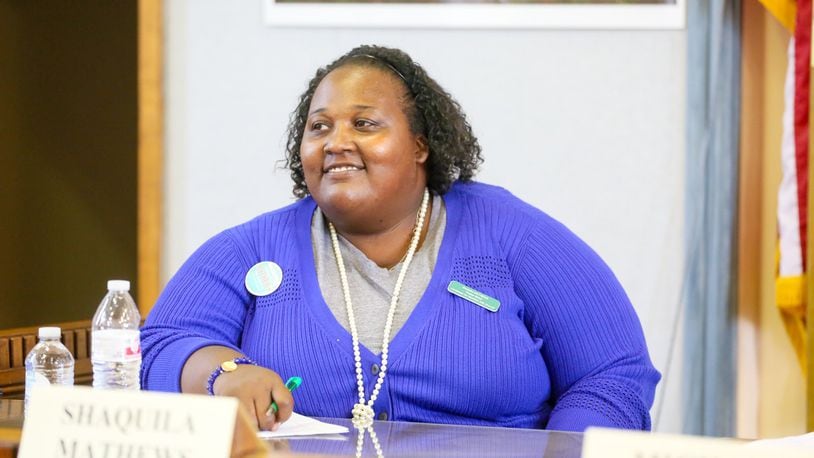In Middletown, for instance, the Middletown City Schools superintendent, executive director of the Middletown Area United Way, director of the Middletown Area YMCA, boys and girls basketball and football coaches at Middletown High School are African-Americans, and the Middletown Division of Police recently promoted an African-American to sergeant for the first time in the department's history.
In Hamilton, the city’s 2018 Citizen of the Year is an African-American woman, for the first time in 30 years.
Rev. Shaquila Mathews
While the Rev. Shaquila Mathews, better known as “Pastor Shaq,” applauds the hiring of more African-Americans, and she said employers should hire people from all backgrounds. She’d like to see more people with disabilities in the work place.
MORE: ‘Pastor Shaq,’ the well-known minister, named Hamilton’s Citizen of Year
“Diversity is bigger than black and white,” Mathews said. “You have to be reflective of your entire community. All walks of life.”
On Friday, Mathews, 38, will be awarded Hamilton’s Citizen of the Year. She said it’s been 30 years since an African-American was named the city’s top honor. Winning proves she can serve as a role model for other women, she said.
MORE: Butler County pastors talk packing heat
“This shows that all things are possible,” said Mathews, who created the Pastor Shaq Job/Mentoring Youth Program, a summer program in Hamilton that engages youth in activities aimed at personal development. “If they see that I can do it, they may say, ‘I can do it. This is obtainable.’”
She was reminded that a decade ago few Americans thought the United States would ever elect an African-American president. Not once, but to two terms.
“Now we can say, ‘We can do that. Put that on the list,’” she said with a laugh.
Pastor Michael Reeves Jr.
As president of National Association for the Advancement of Colored People (NAACP) Unit 3186, which includes Hamilton, Fairfield and West Chester, Pastor Michael Reeves Jr. said he has seen lot of “change” in how African-Americans are hired.
“It’s visible,” he said.
Then he added, “But let’s be real. God would be disappointed. There is a lot of work to be done.”
In fact, Reeves, secretary for the Ohio NAACP State Conference, believes race relations in the country have taken “10 steps backward.” He used to believe it was “a black thing,” but after discussing the issue with many of his white friends, he believes it’s more about equality than race.
“We need to be true to each other,” he said. “Our country needs overhauled. We need to get the right people in there. Period.”
Reeves is pastor at God’s Light Ministry and former senior pastor of Pilgrim Baptist Church in Hamilton. His Sunday services at God’s Light are held in a Presbyterian church in Hamilton. Everyone, he said, regardless of their backgrounds, can get along.
It comes down to “can I trust you and do you love me?” he said.
Terry Sherrer
More than 11 years ago, Terry Sherrer was named executive director of the Middletown Area United Way, and under his leadership, the agency has consistently exceeded its campaign goal.
But he understands some people view him as an African-American man first, leader of the United Way second.
That’s OK with him.
“We are making progress in this city,” said Sherrer, 52. “You don’t have to look far to see that. There seems to more acceptance, regardless of color. The racial fence is not as high. Regardless of your color, it’s about coming together, creating growth for the common good.”
There are meetings in which Sherrer is the only African-American in the room. Being a black leader in a small town, he said, “sets a positive tone for the city” and improves the way all African-Americans are perceived. If he’s successful, he said, that may pave the way for other blacks.
He enjoys talking to young black students about their goals and aspirations. He hopes to serve as a role model.
“They can see that things are possible,” he said.
Marlon Styles Jr.
As superintendent of the Middletown City Schools, Marlon Styles Jr., prefers to be outside his office in the City Building and in the schools with the students.
He’s all about interacting with his staff and the students.
MORE: 5 questions with Middletown Schools’ new superintendent, Marlon Styles
He realizes there are students in the hallways who likely never thought — because of their skin color — they could grow up to be a school superintendent. Then they see Styles, the first permanent black superintendent in Middletown’s history.
“Kids need to have interactions, need to see people of their same race,” Styles said. “It lets them know they can do whatever they want. I see children who may have the same dreams as me. They need to see a young black male in a leadership role. I accept and take pride in that role.”
Styles, 39, was asked about the impact of Martin Luther King Jr. and significance of the national holiday.
“Big question,” he said.
He paused, then answered: “First, what’s possible. He showed the importance of believing, in trying, talking to all people.”
About the Author
